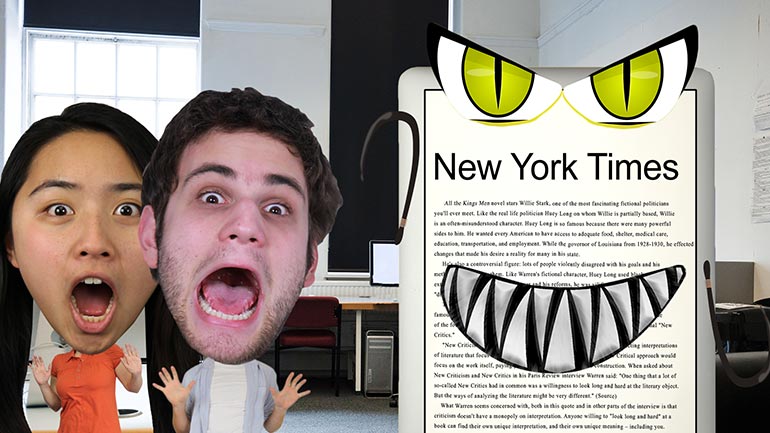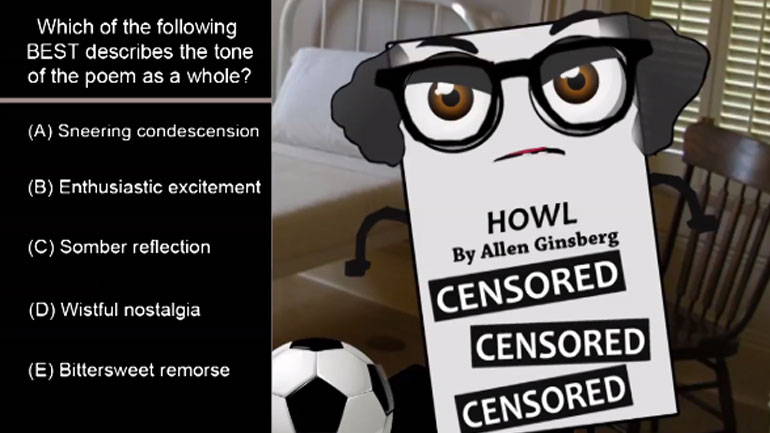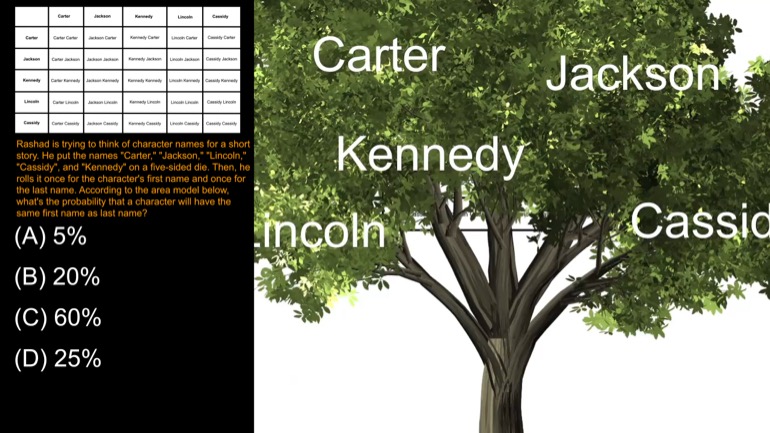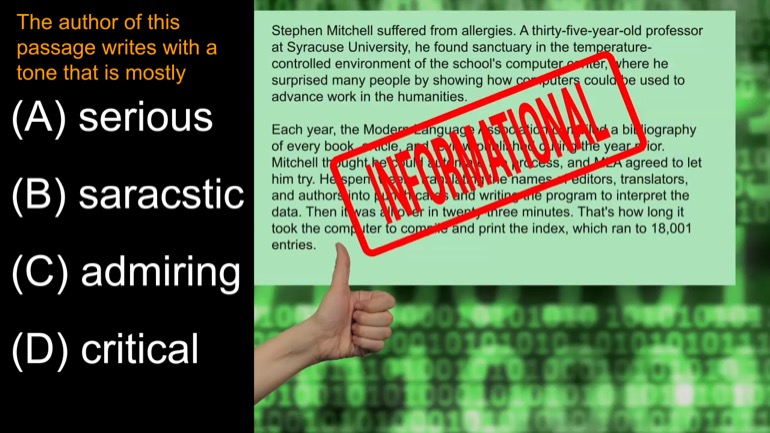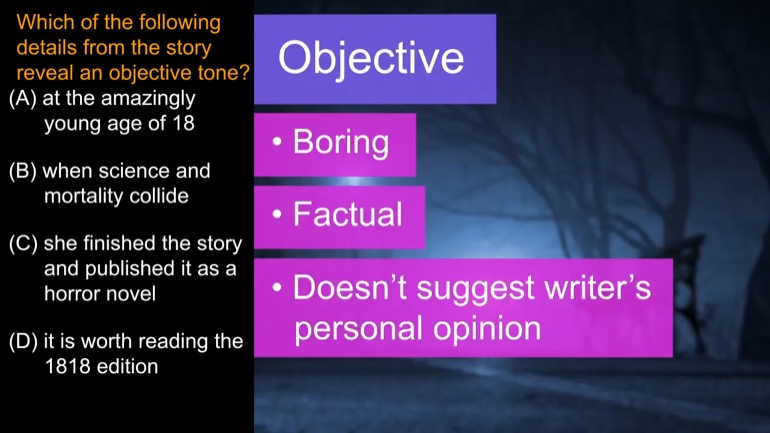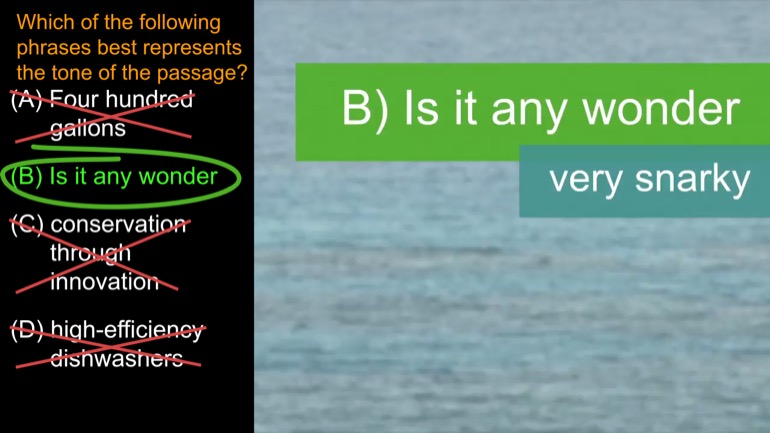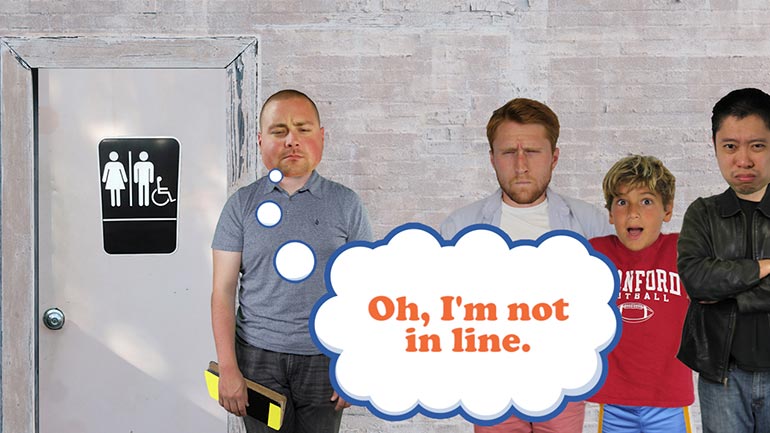ShmoopTube
Where Monty Python meets your 10th grade teacher.
Search Thousands of Shmoop Videos
Tone Videos 9 videos
AP English Literature and Composition 1.2 Passage Drill 3. The tone of this passage is best characterized as what?
AP English Literature and Composition 1.10 Passage Drill 3. What tone shift is indicated by line 49?
Web Literacy: Tone 3634 Views
Share It!
Transcript
- 00:01
We speak student!
- 00:06
Power in Literature
- 00:07
Web Literacy
- 00:09
Tone
- 00:10
[ dog barks ]
Full Transcript
- 00:11
What does tone convey in writing?
- 00:14
Tone is just the author's attitude toward whatever they're writing.
- 00:17
Plain and simple.
- 00:19
One really important thing is to not confuse tone and style.
- 00:23
Tone and writing style are two different things.
- 00:24
People confuse them all the time.
- 00:26
If you go to any of our Shmoop guides,
- 00:27
you'll see a section on tone and a section on style.
- 00:29
So that can help you figure that out.
- 00:31
Writing style is like getting into the nitty-gritty.
- 00:35
"Short sentences" or "Doesn't use punctuation."
- 00:39
Or you might call someone Hemingway-esque.
- 00:42
That's because of the writing style -
- 00:43
short sentences, very simple.
- 00:44
The tone is the author's attitude toward what they're writing.
- 00:48
So that would be, "The author's writing is ironic"
- 00:53
or "It's cynical" or whatever the case is.
- 00:56
Some examples:
- 00:57
Nick Carraway, probably the most famous narrator
- 01:00
in all of literature --
- 01:02
all of American literature.
- 01:03
This is a cynical narrator.
- 01:05
And sometimes the author's attitude toward the text
- 01:10
comes through the narrator in this case.
- 01:12
Other times it's the author themselves
- 01:15
when there's a third person omniscient narrator.
- 01:19
But Nick Carraway is a cynical narrator.
- 01:21
He is saying what he thinks,
- 01:24
and he doesn't like what he sees.
- 01:25
He'll say things like,
- 01:26
"Oh, I felt like I was talking to a child."
- 01:28
Or, "These people -- They're idiots, basically."
- 01:32
He's looking at what's happening
- 01:34
around him and judging it.
- 01:35
And so while Fitzgerald's style may be one way or another,
- 01:40
and while he may use insanely big words --
- 01:44
these like five-dollar words and we don't understand any of it,
- 01:45
that's the writing style.
- 01:47
The tone is cynical.
- 01:48
The tone is how Nick Carraway,
- 01:50
and thus Fitzgerald,
- 01:52
feels about what is happening in the plot.
- 01:55
Then we compare that to
- 01:57
something like Orwell.
- 01:59
Like Animal Farm.
- 02:00
So George Orwell was an essayist.
- 02:02
So his tone is a lot more removed. We'd call that objective.
- 02:06
He writes, you know, reading Animal Farm,
- 02:09
and he'll just be like,
- 02:10
"The pigs tore each other to shreds."
- 02:12
Like no judgment.
- 02:15
There's no, "And that was bad." or "And that was good."
- 02:18
Right, so it's a journalist.
- 02:19
It's actively neutral.
- 02:21
Exactly, exactly.
- 02:22
And that brings up kind of a big issue with tone.
- 02:25
What tone allows us to see
- 02:27
is whether a text is subjective or objective.
- 02:30
We're talking about literature here,
- 02:31
but for what pertains to this course,
- 02:33
and we're talking about web literacy.
- 02:35
This is how you can tell
- 02:36
if a source on the Internet is objective or subjective.
- 02:40
Objective means it's just the facts.
- 02:42
The author's opinion and attitude is not in there.
- 02:46
And I can argue, though, how could it not be?
- 02:49
In that that's a conscious decision.
- 02:51
And by making it appear as if it's just the facts,
- 02:54
you get this journalistic --
- 02:55
Or what journalism used to be 50 years ago.
- 02:57
You get this journalistic credibility
- 02:59
- that it's actually honest and it's not politically biased - Yeah.
- 03:02
- and so on. - Yeah, you're one step ahead of me.
- 03:03
That's exactly right.
- 03:04
So even -- We go back to Orwell.
- 03:06
Clearly Orwell was trying to make a point with Animal Farm.
- 03:09
He was not objective.
- 03:11
But when you write in a way that makes it seem like you're objective,
- 03:15
you sound more credible.
- 03:16
That's why it's very dangerous,
- 03:17
especially with sources on the web,
- 03:19
to just say, like you said, "It's a journal article.
- 03:22
It's from the New York Times or it's from whatever it's from.
- 03:26
Oh, yeah, it's news."
- 03:28
No. You have to look at a lot of different issues,
- 03:30
which we'll get to.
- 03:32
But the first step in figuring out
- 03:35
if you can trust a source on the Internet
- 03:38
is to decide
- 03:39
are we leaning toward objective
- 03:40
or are we leaning toward subjective?
- 03:42
Some pieces, as you mentioned,
- 03:44
are written, "Oh this is totally objective."
- 03:47
whether or not it is.
- 03:48
Others are written with no pretense of being objective.
- 03:51
An opinion piece in a newspaper.
- 03:54
And you know right then and there,
- 03:55
"Okay, this is gonna be subjective."
- 03:57
And knowing whether something is objective or subjective
- 03:59
changes a ton about how you read it.
- 04:01
But again, that all brings us back to tone.
- 04:03
What is the author's attitude toward a text?
- 04:05
When an author's attitude is absent,
- 04:07
it is objective.
- 04:09
When an author's attitude is fully there,
- 04:11
it is subjective. And there's a range.
- 04:12
But figuring out what that tone is
- 04:14
is gonna really help you determine the credibility of a source.
- 04:17
Understood. And some of the clues I know that I think about
- 04:19
when I read writers.
- 04:21
Often it's the sources they cite.
- 04:24
And then that gives deep clarity
- 04:25
for what the author believes.
- 04:27
Definitely. Sources are a huge way
- 04:29
to tell what an author's tone is.
- 04:32
Really the main way you determine tone,
- 04:34
whether it's in literature or in an online article,
- 04:37
is through the word choice.
- 04:38
You can think of it really simply --
- 04:39
I think the example we give in our literature glossary online
- 04:42
is if you're saying, "Dave creeped across the room
- 04:46
and moved gently toward his office."
- 04:49
We get like, "Okay, something's going on here.
- 04:52
What's happening?"
- 04:53
Versus "Dave walked to his office."
- 04:56
We're saying the same exact thing,
- 04:58
but we're using different words.
- 05:00
So word choice, which we call diction, really affects
- 05:04
the tone of the piece.
- 05:06
All right, two words: words matter.
- 05:08
Tone.
- 05:10
[ pen writing ]
- 05:13
What is tone?
- 05:14
What is writing style?
- 05:17
How does the tone help you understand a source's credibility?
- 05:22
What is objective/subjective writing?
- 05:30
[ sings note ]
- 05:32
Yeah, it's not that.
Related Videos
What's the difference between a real estate agent and a real estate broker? Is the latter just, uh... out of cash? Quite the opposite, in fact. Jum...
So... what's a TSA worker, and what do they do? Oh, we thought maybe you knew. Okay, okay... so TSA (or Transportation Security Administration) wor...
